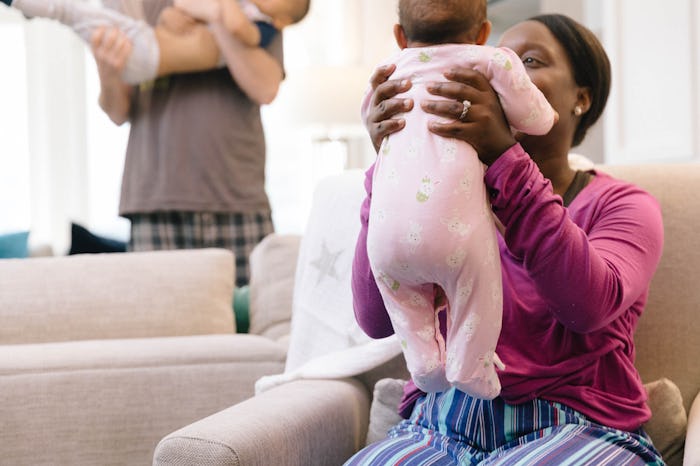Life

Here's What Experts Want You To Know About Using Essential Oils On Babies
From headaches to digestion troubles to stress, essential oil fans claim this particular deviation from western medicine can heal it all. But should you use essential oils on babies? While definitive research on the benefits of essential oils, as a whole, is ongoing, the answer largely depends on the extent of your knowledge of the oils themselves, their effects, the needs of your specific child, and the oils you choose to use.
While you should rule out underlying health problems — such as teething or colic — first, The Baby Sleep Site says the use of essential oils in general should be limited to pure therapeutic grade that don't include any unnecessary additives. You certainly don't want to use dangerous chemicals or pesticides when treating your baby for anything, including their cries, so take care when choosing a specific brand or oil. The same site also notes the need for a carrier oil, which dilutes the heavy concentration of the essential oil. These "carrier oils" can be, according to The Baby Sleep Site, "olive oil, almond oil, coconut oil, grapeseed oil, and jojoba oil."
Regardless of which oil you choose, just 1-2 drops per two tablespoons of carrier oil should do the trick for a baby. In addition, 1-2 drops per 1/2-1 teaspoon for a toddler or preschooler will work once your child is older, too.
When it comes to use of specific essential oils for your crying baby, Dr. Josh Axe, D.N.M., C.N.S., D.C., founder of Ancient Nutrition and DrAxe.com, tells Romper via email that essential oils are "generally safe for babies." In the end, the amount a parent uses, and the location being treated, matter most. Dr. Axe doesn't recommend using essential oils topically on babies until they are at least 3 months old, adding that it's especially important "to introduce one oil at a time in order to rule out sensitives or adverse reactions, like a rash or itchiness."
As far as which oils are best for calming, Dr. Axe suggests roman chamomile, lavender, ginger, lemon, peppermint, eucalyptus, and tea tree oil. To use, Dr. Axe says to dilute the oil (as previously mentioned), and rub into the baby’s abdomen, back, and feet. For those new to essential oils, Dr. Axe says to begin by "mixing 1-2 drops of lavender with a small amount of coconut oil and rubbing it into your baby’s feet." He also says this particular set-up "may help to relax your baby, helping him or her to calm down and fall asleep."
When your baby cries, using an essential oil won't make your baby stop crying, but it could help calm them down long enough for you to determine the reason behind their cry. If you're considering using essential oils, HealthGuidance.org suggests rubbing the oil in a clockwise motion (along the natural path of blood flow) and/or the bottom of your baby's feet, as it has the fastest absorption rate. The use of oils is said to help with things like colic, constipation, diaper rash, colds and teething, among other things. For crying, the same site advises frankincense, geranium, rose otto, or cypress either diluted or with a diffuser.
If you've used all other resources and concluded there's nothing physically "wrong" with your baby, but he or she still won't stop crying, hang in there. The Baby Sleep Site offers a few tips to consider in terms of essential oil use. Try a soothing bedtime massage or put a few drops in bathwater. As with any of the oils, it bears repeating: always dilute with a carrier oil for safety. And before you jump in and give this method a try, consult your pediatrician to be sure the chosen oils won't cause an allergic reaction or additional discomfort.
Check out Romper's new video series, Bearing The Motherload, where disagreeing parents from different sides of an issue sit down with a mediator and talk about how to support (and not judge) each other’s parenting perspectives. New episodes air Mondays on Facebook.